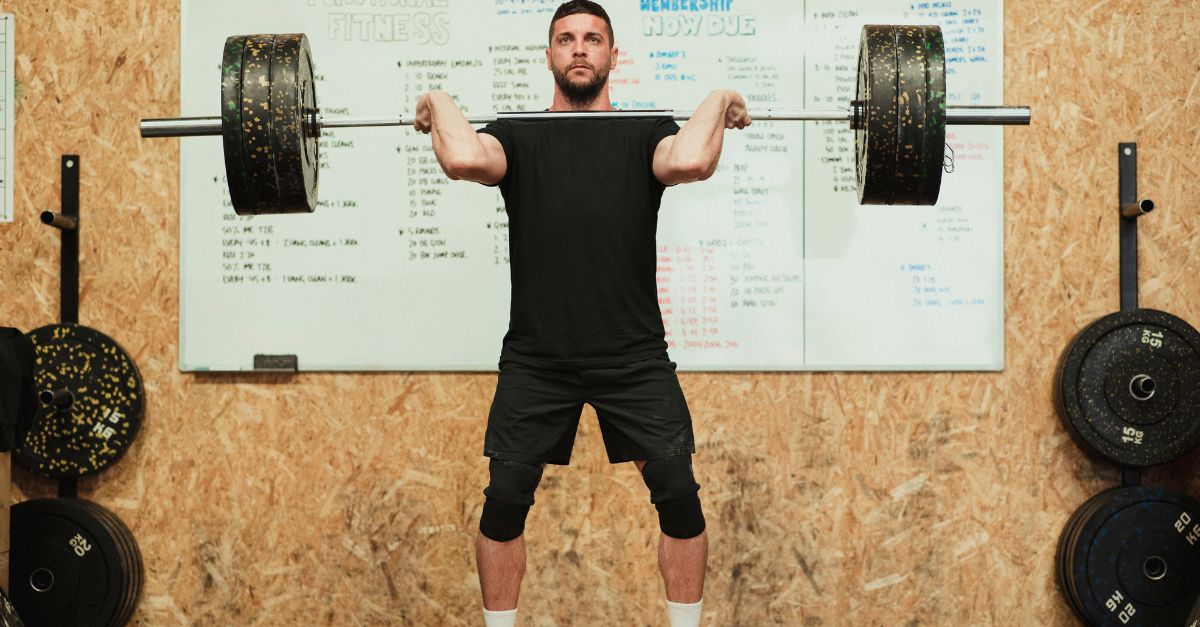Hey there, fitness enthusiasts and fellow gym-goers! Ever noticed that after a grueling front squat workout, your voice takes on a somewhat different tone? It’s a peculiar phenomenon, right? Well, you’re not alone.
In this blog, we’re diving into the curious world of why your voice seems to go a bit “thin” after those intense front squats.
So, let’s unravel the mystery together and understand what’s going on behind the scenes when your vocal cords hit that post-workout high note!
Exploring the reason Why your voice is thinner after a front squat workout routine.
Your voice may feel or sound thinner after a front squat workout routine due to several interconnected factors.
It can be attributed to the following reasons:
Increased Respiration: During a front squat workout, you engage various muscles, including your core and diaphragm, to stabilize your body.
This increased physical exertion can lead to heavier and more rapid breathing.
Fast, shallow breaths can affect the resonance of your voice, making it sound thinner.
Dehydration: Intense exercise, like front squats, can lead to increased sweating and fluid loss.
Dehydration can dry out the vocal cords, making your voice sound thinner and potentially causing temporary hoarseness.
Tension in Neck and Throat: Front squats require you to maintain a proper posture, which often involves holding the barbell in front of your neck and shoulders.
This can lead to tension in the neck and throat area.
Tense neck and throat muscles can impact vocal cord function and change the quality of your voice.
Fatigue: Front squats are a demanding lower-body exercise that can leave you feeling physically exhausted.
Fatigue can affect your overall muscle coordination, including the muscles responsible for voice production, leading to a change in the sound of your voice.
Vocal Cord Strain: While not directly related to the exercise itself, if you are grunting or exerting force during front squats, you might be straining your vocal cords.
This strain can result in temporary voice changes.

To mitigate these effects and maintain vocal quality during and after a front squat workout routine, you can:
- Stay hydrated before, during, and after your workout to prevent vocal cord dryness.
- Pay attention to your breathing technique, focusing on deep, controlled breaths.
- Practice proper vocal hygiene, including gentle warm-up and cool-down exercises for your voice.
- Avoid excessive strain or grunting during your workouts, as this can harm your vocal cords.
- Consider incorporating neck and throat relaxation exercises into your post-workout routine to release tension.
If you experience persistent or concerning changes in your voice after exercise, it’s a good idea to consult a healthcare professional or a speech therapist for a thorough evaluation and guidance tailored to your specific situation.
Further Explanations.
Let’s dive deeper and elaborate further on all the points mentioned.
Firstly though, let’s delve deeper into how increased respiration and dehydration during a front squat workout can affect your voice:
Increased Respiration:
Muscle Engagement: During a front squat, your body engages several muscle groups, including your legs, core, and back. These muscles work together to stabilize your body and support the weight of the barbell. As a result, your diaphragm and intercostal muscles (the muscles between your ribs) have to work harder to provide the necessary oxygen to these muscles.
Breathing Rate: To meet the increased oxygen demand, your body naturally increases your breathing rate. This can lead to rapid, shallow breathing, especially when performing strenuous exercises like front squats.
Voice Resonance: The way your voice sounds is influenced by the resonance in your vocal tract. When you breathe rapidly and shallowly, it can change the airflow through your vocal cords and the resonance in your throat and mouth. This altered airflow and resonance can cause your voice to sound thinner or less resonant.
Dehydration:
Sweating and Fluid Loss: Intense exercise, including front squats, causes your body to produce more sweat as it tries to cool down. Sweating is a natural mechanism to regulate body temperature, but it can lead to significant fluid loss.
Impact on Vocal Cords: Dehydration can have a direct impact on the mucous membranes in your body, including those lining your vocal cords. When these membranes become dry, they may not vibrate as effectively. Vibrating vocal cords are essential for producing a rich, full voice. When they are dry, your voice can sound thinner and may even become hoarse.
Hoarseness: Prolonged or severe dehydration can lead to hoarseness in your voice, making it sound raspy or strained.
To prevent these effects on your voice during and after a front squat workout:
Hydration: Prioritize proper hydration before, during, and after your workout. Drinking enough water helps maintain the moisture levels in your body, including your vocal cords.

Breathing Technique: Focus on controlled, deep breathing during exercise. Try to breathe through your diaphragm rather than shallowly through your chest. This can help maintain better vocal resonance.
Vocal Rest: If you notice changes in your voice after a strenuous workout, consider giving your vocal cords some rest. Avoid straining or excessive talking until your voice returns to normal.
Remember that these effects on your voice are usually temporary and can be managed with proper hydration and breathing techniques.
However, if voice changes persist or worsen, it’s advisable to consult with a healthcare professional or a speech therapist for a more thorough evaluation and personalized guidance.
let’s provide a more detailed explanation of how tension in the neck and throat and overall fatigue from front squats can impact the quality of your voice:
Tension in Neck and Throat:
Proper Front Squat Posture: Front squats require you to maintain a specific posture, which includes holding the barbell in front of your neck and shoulders. This posture is essential for stability and safety during the exercise.

Muscle Engagement: To support the weight of the barbell and maintain this posture, your body engages various muscles in the neck, shoulders, and upper back. These muscles work to keep your spine and head in the correct alignment.
Impact on Neck and Throat: The sustained engagement of these muscles can lead to tension and tightness in the neck and throat area. When these muscles are tense, it can affect the position and movement of your larynx (voice box) and the surrounding structures, including the vocal cords.
Vocal Cord Function: Tense neck and throat muscles can interfere with the flexibility and coordination of your vocal cords. Your vocal cords need to move freely and vibrate effectively to produce a clear and resonant voice. Tension in the surrounding muscles can disrupt this process, causing your voice to sound strained or less controlled.
Fatigue:
Demanding Exercise: Front squats are a strenuous lower-body exercise that targets multiple muscle groups, including the quadriceps, hamstrings, glutes, and lower back. Performing this exercise with proper form and sufficient weight can be physically demanding.
Energy Depletion: As you perform front squats, your body expends a significant amount of energy to lift the weight and stabilize your body. This can lead to overall fatigue, especially in the lower body and core muscles.
Impact on Voice Muscles: Fatigue in the lower body and core can affect your overall muscle coordination. This includes the muscles involved in voice production, such as the diaphragm (a major muscle for breathing), which plays a critical role in controlling the airflow for speech. When fatigued, these muscles may not function optimally, leading to changes in your voice quality, such as weakness or wavering.
To address these issues and maintain the quality of your voice during and after a front squat workout:
Proper Warm-Up: Warm up your neck, shoulders, and throat muscles before starting your workout to reduce the risk of excessive tension.
Stretching and Relaxation: Incorporate post-workout stretching and relaxation exercises for the neck and throat to release any built-up tension.
Manage Weight and Reps: Ensure that the weight and repetitions of your front squat routine align with your current fitness level to minimize excessive fatigue.
Stay Hydrated: Adequate hydration can help reduce muscle tension and fatigue throughout your body, including the muscles involved in voice production.
While it’s common to experience temporary changes in your voice after a challenging workout like front squats, these changes should resolve with rest, hydration, and proper muscle care.
If vocal changes persist or worsen, consider consulting with a healthcare professional or a speech therapist for personalized guidance and evaluation.
Vocal Cord Strain
Let’s explore how vocal cord strain during front squats can lead to temporary voice changes:
Grunt or Exertion: During physically demanding exercises like front squats, it’s not uncommon for individuals to emit grunts or exert force when lifting heavy weights.
This is a natural response to the effort required and can help with stability and power.
Increased Intra-abdominal Pressure: When you grunt or exert force, you often increase the pressure within your abdominal cavity. This pressure assists in stabilizing your core and spine during the lift.
Vocal Cord Engagement: The act of grunting or exerting force can also involve the engagement of your vocal cords, especially if you forcefully exhale or make noise while lifting. This engagement may not be as extreme as when speaking or singing, but it can still strain the vocal cords over time.
Impact on Voice: Repeated vocal cord strain during workouts can lead to temporary changes in the sound of your voice. Your vocal cords are sensitive structures, and even minor strain can cause hoarseness, raspiness, or a change in pitch or tone.
To prevent vocal cord strain during front squats and maintain vocal quality:
Conscious Breathing: Pay attention to your breathing technique. Instead of forcefully grunting, try to exhale steadily and evenly during the most challenging phase of the lift. This can help reduce unnecessary strain on your vocal cords.
Hydration: Stay adequately hydrated to keep the vocal cords lubricated and less prone to strain.
Voice Rest: If you notice any voice changes or discomfort after your workout, give your vocal cords some rest. Avoid excessive talking, yelling, or further straining until your voice returns to normal.
Consider Noise Reduction: If you train in a public gym or with others, be mindful of the noise you produce during your workout. Excessive and loud grunting can be distracting to others and may also increase vocal cord strain.
While vocal cord strain during exercises like front squats is typically temporary, it’s important to listen to your body. If you experience persistent vocal changes, discomfort, or pain in your throat, consider consulting with a healthcare professional or a speech therapist for evaluation and guidance on vocal care.
A complete tabular on this topic here.
Here’s a tabular summary of why your voice may sound thinner after a front squat workout routine:
| Factor | Explanation | Impact on Voice |
|---|---|---|
| Increased Respiration | During front squats, increased physical exertion leads to rapid, shallow breathing. | Alters vocal resonance; voice may sound thinner. |
| Dehydration | Intense exercise causes increased sweating and fluid loss, potentially drying out vocal cords. | Can lead to hoarseness and thinner voice due to dry vocal cords. |
| Tension in Neck and Throat | Maintaining proper posture during front squats can cause tension in neck and throat muscles. | Tense muscles can affect vocal cord function and voice quality. |
| Fatigue | Front squats are physically demanding and can lead to overall muscle fatigue, including voice-related muscles. | Fatigue can impact muscle coordination, leading to changes in voice quality. |
| Vocal Cord Strain | Grunting or exerting force during front squats can strain vocal cords, resulting in temporary voice changes. | Strained vocal cords may cause hoarseness and changes in pitch or tone. |
These factors, either individually or in combination, can contribute to your voice sounding thinner after a front squat workout routine. Proper hydration, breathing techniques, and vocal care can help mitigate these effects.
Conclusion.
Your voice may sound thinner after a front squat workout routine due to a combination of factors, including increased respiration, dehydration, tension in the neck and throat, fatigue, and vocal cord strain.
These factors can collectively impact vocal resonance and quality. Staying hydrated, using proper breathing techniques, and practicing vocal care can help alleviate these effects and maintain vocal quality.

Hey there, it’s Mike Rrsq, the Editor-in-Chief over at Jsquat.com, and I’m absolutely obsessed with all things squat fitness! I’ve been lucky enough to get some serious recognition for my work in this field. With a solid background in the fitness and wellness industry, I’ve been there right from the get-go, helping shape this website into what it is today.
You see, I’m not just the boss around here; I’m also a passionate contributor. I love sharing my insights through my articles, and trust me, they’re not your run-of-the-mill stuff. Each piece I write is a labor of love, filled with my expertise and real-world experience in the fitness universe. So, if you’re into fitness and looking for some inspiration, you’re in the right place!

